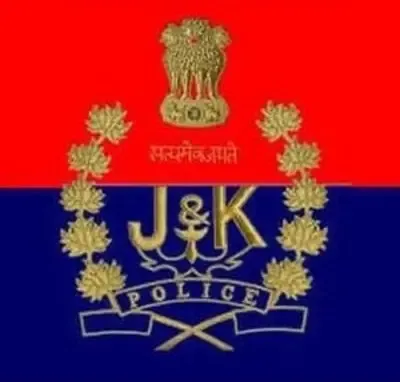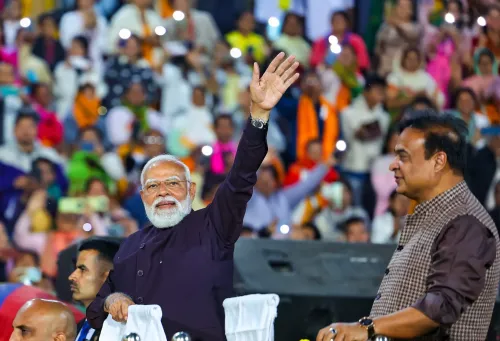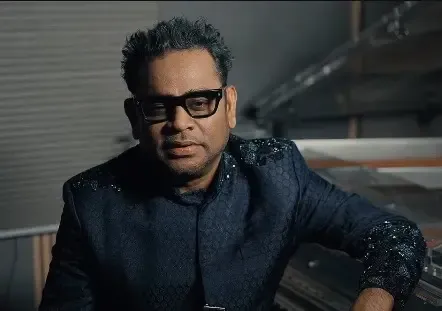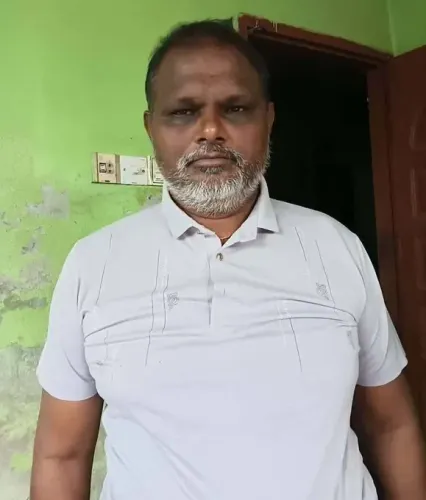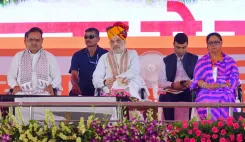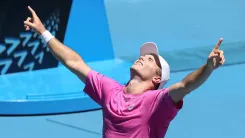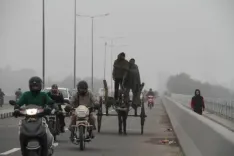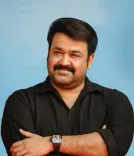The Third Eye: Indo-US Strategic Alliance Under Trump Remains Steady
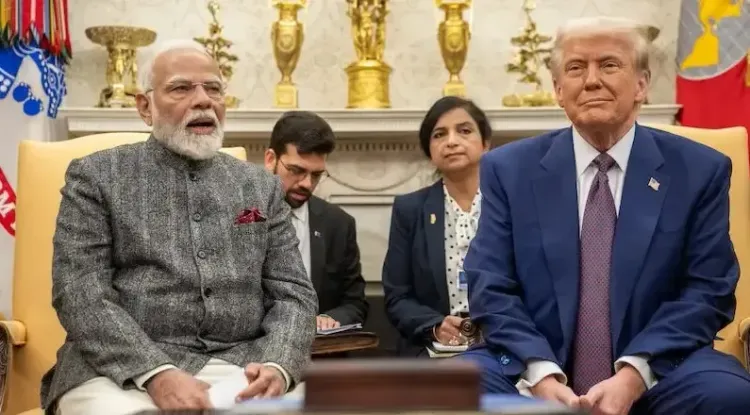
Synopsis
Key Takeaways
- India balances its approach to US relations under Trump.
- Mutual cooperation is essential for both countries.
- Focus on security and trade in the Indo-Pacific region.
- AI collaboration presents new opportunities.
- Strategic friendship based on shared interests.
New Delhi: India has successfully embraced a measured and equitable stance towards the evolving policy landscape of US President Donald Trump, known for his unpredictable, reactive, and autocratic tendencies.
As a leading nation with influence over global peace and economic matters, India should navigate India-US relations on the understanding that both nations require each other to further their national interests.
This was evident during Prime Minister Narendra Modi's initial meeting with President Trump at the White House on February 13.
The positive atmosphere for this encounter was established through the camaraderie displayed in their phone discussion on January 27.
After the call, the Prime Minister expressed that the two nations were 'dedicated to a mutually beneficial and trustworthy partnership' aimed at enhancing the welfare of their citizens and fostering global peace, prosperity, and security.
President Trump characterized the call with Prime Minister Modi as 'productive' and highlighted that the 'deepening and expanding' bilateral collaboration along with security concerns in the Indo-Pacific, Middle East, and Europe were discussed.
He specifically noted that Prime Minister Modi 'will do what is correct' regarding the repatriation of Indian immigrants who entered the US illegally.
Meanwhile, the numerous directives signed by President Trump on his first day in office for his second term on January 20 confirmed his focus on domestic governance, economic issues, and border security, opposing 'compulsory' funding for global human rights projects while committing to an 'America First' doctrine in foreign affairs, trade, tariffs, and engagements in global conflicts.
India has reason to feel satisfied with the new US President's clear denunciation of global terrorism rooted in 'radicalization'—he mandated close examination of visa applications from 'specific countries and regions' known to foster 'faith-based' terrorism—as well as his stance towards China.
Trump was openly critical of China while announcing the US withdrawal from WHO—claiming the UN agency was 'under Chinese control.'
Additionally, he asserted the US's right to 'reclaim' the Panama Canal, arguing that it had been 'unjustly exploited by China.'
Evidence suggests that President Trump intends to rely on India as part of his strategy against China.
The resumption of the Quad Foreign Ministers' meeting—facilitated by the new US Secretary of State, Marco Rubio, on January 21—marked a crucial continuation of US-India policy on the Indo-Pacific, addressing Chinese encroachment in the maritime area.
The Quad meeting highlighted that countering China is a priority for the Trump administration.
The joint statement released after the meeting praised that India's leadership level meeting for Quad would take place this year.
The 'national emergency' declared by President Trump to 'remove' all illegal immigrants aligns with the 'America First' agenda.
This allowed the US President to deploy military personnel to enhance surveillance on the Southern border and instruct Homeland Security to form teams in all states to actively identify illegal elements posing an 'internal security' risk.
Notably, during his first press conference, President Trump stated regarding H1B visas that 'he is on both sides of the debate' and indicated he did not aim to hinder the entry of 'engineers' recruited by major US corporations via these visas.
However, he insisted that 'working jobs' should be allocated to Americans, except where immigrants were required based on 'merit' rather than merely for cost-cutting purposes.
The dispatch of 104 'illegal migrants' back to India by the US in a military aircraft—bound and shackled—as the first group sparked political reactions domestically and indicated the necessity for appropriate diplomatic actions.
Prime Minister Modi made it a point to reaffirm India's commitment to repatriating its identified nationals deported for illegal residency during his meeting with Trump, viewing this as India's collaboration in combating the 'illegal ecosystem that facilitates human trafficking.'
Trump's well-known disinterest in the European Union and NATO, coupled with his history of maintaining favorable relations with President Putin of Russia, presented him with a unique opportunity to act as a moderating influence in the Ukraine-Russia conflict.
During his interaction with Ukrainian President Volodymyr Zelensky at the Oval Office on February 28, however, Trump appeared to pressure him to pursue peace negotiations with President Putin, seemingly overlooking Ukraine's security concerns in light of Russia's military intervention nearly three years prior, thus indicating a bias towards Putin.
His suggestion that a deal between Ukraine and the US regarding the mining of rare earth minerals in the eastern region would deter Russian aggression was an unconvincing assurance for Zelensky.
Trump's skepticism towards the EU and NATO also colored his perspective on Ukraine.
In the Israel-Hamas conflict, Trump remains staunchly supportive of Israel and entirely opposed to Hamas, urging for a rapid 'clean-up' of Gaza by Israel.
Trump's vision for Gaza's future as a territory that could serve US interests is unlikely to resonate well with Palestinians and the broader Muslim community.
Interestingly, Trump's inaugural foreign call was to Saudi Crown Prince Mohammed bin Salman, emphasizing further Saudi investments in the US rather than addressing the tumultuous situation in the Middle East.
While President Trump is not inclined towards an 'interventionist' stance in global conflicts, he is willing to demonstrate US 'muscle power' when necessary to assert his 'America First' agenda.
A new aspect of India-US relations lies in the potential collaboration in the emerging domain of Artificial Intelligence (AI) applications.
Trump announced shortly after assuming office a $500 billion AI infrastructure investment in the US, supported by leaders from three leading tech firms—OpenAI CEO Sam Altman, SoftBank CEO Masayoshi Son, and Oracle Chairman Larry Ellison—who were present at the White House for the announcement.
The three corporate executives unveiled the launch of a new company named StarGate, aimed at 'transforming computational capabilities in the US,' with President Trump emphasizing that this initiative would generate a hundred thousand jobs in the US.
The emergence of DeepSeek, a Chinese AI assistant startup from Hangzhou that matched the current capacity of US AI at a fraction of the investment, prompted Trump to label it a 'wake-up call' for US companies and Silicon Valley to 'innovate more economically.'
Prime Minister Modi attended the AI Action Summit in Paris on February 10-11 as co-chair before traveling to the US for a meeting with President Trump.
During the summit, the Prime Minister stressed that India is a global leader in AI adoption and possesses the largest skilled AI workforce.
Prime Minister Modi's eagerly awaited visit to Washington for a meeting with President Trump commenced positively when Tulsi Gabbard, Director of National Intelligence (DNI), became the first senior appointee of Trump to meet the Prime Minister at Blair House on February 13.
The closed-door discussion between the Prime Minister and the US President at the Oval Office was followed by a joint press conference where they praised each other and harmoniously addressed key topics such as trade, tariffs, illegal immigration, and security, setting a forward-looking trajectory for India-US strategic relations.
Trump referred to Prime Minister Modi as 'a great leader,' while Modi described the US President as 'a friend.'
In a remarkable understanding of Trump's character, the Prime Minister acknowledged the MAGA movement and the 'America First' doctrine, asserting that he also espouses 'Make India Great Again' and prioritizes India's national interests above all else, believing that cooperation between the two countries under this strategy would benefit both.
On tariffs, the two leaders announced their intent to pursue a framework for enhanced cooperation through negotiations to resolve longstanding disparities.
Collaboration on space exploration, Artificial Intelligence, and energy production, along with international security, received significant attention in their remarks during the press conference.
Trump proclaimed that 'US ties with India are stronger than ever.'
It is evident that President Trump's foremost concern is accelerating the American economy, as demonstrated by his announcements that an agreement between India and the US will 'reestablish the US as the primary supplier of oil and gas to India,' that the US has consented to sell the fifth-generation F-35 stealth fighter to India, and that the value of India-US trade is projected to reach $500 billion by 2030.
The fight against radical Islamic terrorism has solidified India-US cooperation, with President Trump pledging to extradite Tahawwur Rana, a key suspect in the 'horrific' Mumbai terror attack, and Prime Minister Modi labeling the 26/11 incident as an act of 'genocide.'
The strategic partnership between India and the US has been further strengthened by Trump's endorsement of the India-Middle East-Europe Economic Corridor, initially proposed in September 2023.
He described the corridor as 'stretching from India to Israel to Italy and owned by the US, connecting ports, railways, and underground cables,' stating that 'it would allow the US to maintain its leadership,' implicitly referencing the economic competition from China's Belt and Road Initiative (BRI).
The Trump-Modi meeting in Washington reaffirmed the ongoing strategic friendship between the two nations, grounded in mutual trust and the pursuit of national interests.
(The writer is a former Director of the Intelligence Bureau. Views are personal)


